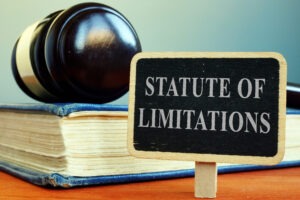
In Indiana, you typically have two years to file a personal injury claim. However, there are exceptions to this two-year statute of limitations. For example, cases involving minors or persons with disabilities will have a different timeline.
If you are considering filing a civil suit, you should understand the specifics of this two-year window. A personal injury lawyer in Indiana can review your case and provide specific information about your available time.
Why do Statues of Limitations Exist?
A statute of limitations sets a time limit where legal proceedings must occur. In general, you must file your compensation claim within this two-year window.
The two-year period also applies to civil actions. The intent is to ensure fairness in the legal system by presenting cases when events are still fresh in participants’ minds, expediting the legal process, and eliminating backlogs.
The statute of limitations can also bring closure to accident victims and defendants who may be eager to move on from a difficult time in their lives.
Your Case Will Get
The Attention It Deserves

What Happens if You Miss the Statute of Limitations in Indiana?
If the statute of limitations expires, the court can dismiss your case, preventing you from seeking compensation for your financial losses. Therefore, we recommend contacting a personal injury attorney quickly after your accident.
Securing fast legal assistance can help you avoid issues with the statute of limitations that could derail your case. Missing the two-year limit can mean losing your rights to legal action and the ability to recover fair compensation for medical expenses.
What Are Some Exceptions to the Statute of Limitations?
Several exceptions can extend or toll (pause) the statute of limitations for filing a personal injury lawsuit in Indiana. One or more of these exceptions could apply to your claim, impacting how long you have to file a personal injury claim in Indiana.
The statute of limitations limit can include extra time when:
The Accident Involves a Minor
If the injured person is a minor under age 18, the court often tolls the statute of limitations until they reach age 18. Then, they would have two years from their 18th birthday to file a personal injury claim.
The Injured Party Experiences Mental Incompetence
If the injured person is mentally incompetent or cannot understand their legal rights, the court may toll the statute of limitations until the wounded party regains competency. A lawyer can provide more information about this exception.
The Accident Causes Latent Diseases
For illnesses or conditions that do not manifest until years later, the statute may begin from when you discover the illness, not the initial exposure. This situation may apply to asbestos exposure cases or medical malpractice claims in Indiana.
The Accident Involves Fraud or Concealment
The court may extend this deadline if the defendant concealed vital information about the injury or if a defendant engaged in fraud. Your lawyer must show they couldn’t have discovered the facts earlier through reasonable diligence.
Other Issues Surround the Accident
Several other factors may impact the statute of limitations. For example, filing for bankruptcy can put civil legal proceedings on hold and toll the statute of limitations. Additionally, the court may adjust the deadline if the defendant dies before being served.


When does the Statute of Limitations Begin?
In Indiana, the personal injury statute of limitations starts from the time of your accident. However, the countdown may start at different points in some circumstances.
For example:
- If it takes significant time to discover your injuries or an illness caused by another party, the statute may start running at the time of your official diagnosis.
- In cases involving minors, the two-year period will start when they turn 18.
- When a defendant’s whereabouts are unknown, the statute of limitations may pause and begin again once they are apprehended.
You can learn more about the specific deadline for your claim with an Indiana personal injury lawyer so you can preserve your rights to a fair settlement.

When Should You Contact a Lawyer After an Accident?
You may avoid issues with the two-year statute by seeking legal representation from a personal injury attorney in Indiana immediately after an accident. You do not have to wait a set time before you begin the process of filing a personal injury lawsuit.
Getting help right away can make it easier for your lawyer to build your compensation claim. For example, your lawyer may collect witness statements before they forget what happened and gather evidence before it disappears, building a stronger claim to bring you damages.
This gives you a greater chance of recovering the costs of your medical bills and other economic expenses, and it leaves time to consider a civil lawsuit if necessary.
What Compensation Can You Get Through a Personal Injury Claim?
Filing your personal injury claim on time can allow you to secure funds for financial recovery. You may receive several kinds of damages. While every case is different, they may include
Economic Damages
Economic damages are easy to assess because they are attached to a specific financial cost. They include:
- Medical bills such as doctor visits, physical therapy, and medications
- Future healthcare needs
- Lost wages
- Reduced future earning potential
- Property damage
Non-Economic Damages
Non-economic damages are less straightforward and only available in certain circumstances. They address some of the mental and emotional hardships you might endure. An experienced attorney can advise you if you are eligible for things like:
- Pain and suffering
- Mental anguish
- Loss of enjoyment of life
While not represented in your medical bills, maintaining records for counseling visits and keeping notes on how your injury has impacted you and your family can help your attorney prove your case.
Punitive Damages
Punitive damages are a special class of damages awarded by a court. They are intended to punish the at-fault party and deter similar behaviors in the future.
While awards for punitive damages are rare, when you miss your statute of limitations deadline, you forfeit your rights to civil trial and the potential for maximum compensation.
How do You File a Claim to Avoid Issues With the Statute of Limitations?
Working with a personal injury lawyer can keep you on track to secure compensation before the statute of limitations deadline expires for your claim. Law firms often focus on what a settlement means to their client versus a civil trial, as the settlement process is typically less stressful.
However, in some situations, your personal injury law firm may help you file a lawsuit against the individual who caused your injuries. Note that you do not have to completely resolve your lawsuit before the statute expires to receive compensation.
Learn More About Filing a Claim in Indiana
How long do you have to file a personal injury claim with an insurance company in Indiana? Generally, you have about two years, though the exact time may vary based on your circumstances. If you intend to seek financial compensation after an accident, it is important to know the law.
An Indiana personal injury lawyer can help. In most cases, missing the statute of limitations means forfeiting your rights to legal action. We can keep you on track so you don’t miss important deadlines and lose your legal claim.
At Vaughan & Vaughan, our firm has represented Indiana accident victims since 1913. Contact us today to find out how we can help with your personal injury claim.




